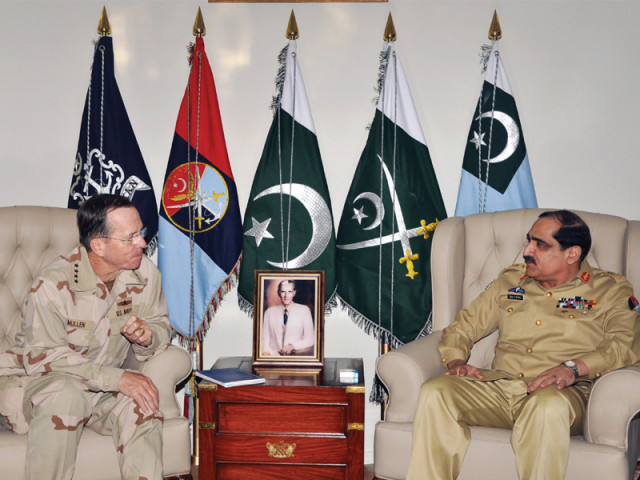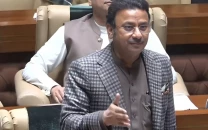Mullen’s fence-mending visit strikes sour note
US admiral’s statement about ISI-Haqqani links comes just before crucial meetings with Gen Kayani and Gen Waynne.

Mullen’s fence-mending visit strikes sour note
Meetings between military brass from Pakistan and the United States on Wednesday made little headway to break months of deadlock, which hit a new low as US’ top military official openly accused Pakistan’s premier spy agency of having a ‘longstanding’ relationship with an Afghan Taliban-linked group allegedly based in North Waziristan.
“It’s fairly well known that the ISI has a longstanding relationship with the Haqqani Network,” US Chairman of the Joint Chiefs of Staff Admiral Michael Mullen said just before meeting Pakistan’s military brass.
“Haqqani is supporting, funding, training fighters that are killing Americans and killing coalition partners. And I have a sacred obligation to do all I can to make sure that doesn’t happen,” he told Pakistani media after his arrival in Islamabad from Afghanistan.
Admiral Mullen’s comments were not the first by US officials pointing the finger at elements of the ISI and their alleged links to the Haqqani Network.
But Wednesday’s forceful and repeated remarks by Mullen about those ties suggest Washington is not about to back away from calls for Pakistan to take a more assertive stand against the Haqqanis – even as the US seeks to mend diplomatic ties with Islamabad.
Admiral Mullen made the statement ahead of his meetings with his Pakistani counterpart Gen Khalid Shameem Wynne and Chief of the Army Staff Gen Ashfaq Parvez Kayani.
Despite Mullen’s charges against the ISI, he underlined the importance of security cooperation between Pakistan and the US, depicting how heavily Washington relies on Islamabad for an exit from Afghanistan possibly later this year.
A US embassy statement issued after the meetings said Mullen had promised Pakistan continued support in its fight against militancy.
“Throughout the visit, the admiral emphasised the long-term US commitment to supporting Pakistan in its fight against violent extremists,” the statement said.
The crucial talks between Mullen and Kayani were meant to defuse tensions that had been mounting after CIA operative Raymond Davis killed two Pakistanis in Lahore early this year.
Military and civilian leaders from both sides have since been involved in a series of efforts to save the troubled alliance but there has not been any significant headway.
Admiral Mullen acknowledged this bad patch in bilateral ties but sounded optimistic about the future.
“The ability to sustain a very difficult period as we have recently, between Pakistan and the United States, is in some ways indicative of the strength of the relationship,” he said. “That doesn’t mean we don’t have challenges to continue to address, because we do.”
There was a surprise mum by the Pakistani military till late Wednesday and no official word was offered. Security officials, however, said Gen Kayani had rejected fresh accusations by the American admiral.
The ISI has long been suspected of maintaining ties to the Haqqani Network, cultivated during the 1980s when Jalaluddin Haqqani was a feared battlefield commander against the Soviet Union in Afghanistan.
A senior Pakistani intelligence official rejected any suggestion of collusion. “I don’t know what kind of relationship he’s talking about. If he means we’re providing them with protection, with help, that’s not correct,” he said. “Even if you are enemies, you have a relationship.”
He said Pakistan had attacked Haqqani’s positions and raided his mosques in the past. “Right now, we are not attacking him because we are fully engaged against another group, the Tehreek-e-Taliban Pakistan (TTP),” he said.
The US has been pushing Pakistan to go after the Haqqanis in their alleged stronghold in North Waziristan. However, Pakistan says that its military is engaged on too many fronts to launch an offensive in North Waziristan.
The CIA has, in the meantime, launched a drone campaign against ‘terrorist sanctuaries’ in the region despite repeated protests from the Pakistan government. However, the March 17 drone strike on a tribal jirga in the Mirali area of North Waziristan which had killed over 40 people was openly condemned by Gen Kayani.
Since then, according to media reports, Pakistan has been asking the US to scale back the CIA drone campaign in its tribal regions.
On Wednesday Pakistani journalists also pressed Mullen about the drone attacks. US officials do not publicly acknowledge the US drone programme, leaving Mullen to only restate his confidence in US-Pakistan ties. “What’s really important is the relationship between our two countries,” Mullen said.
But Reuters news agency quoted a US official as saying that Washington would not abandon its drone programme but how it goes forward is a matter for US and Pakistani intelligence and military officials to determine.
“The programme is something that we have said we will go ahead on. The question is how. And that process is going to be something that’s going to be one of the main tasks that our intel and our military guys have,” the official said, speaking to reporters on condition of anonymity.
With additional input from Reuters
Published in The Express Tribune, April 21st, 2011.



















COMMENTS
Comments are moderated and generally will be posted if they are on-topic and not abusive.
For more information, please see our Comments FAQ